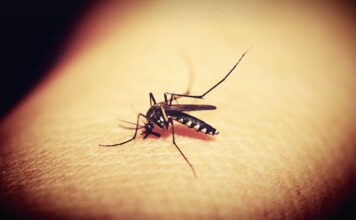Dust in the air can impact the health of sensitive populations, but on Earth, it has the effect of temporarily slowing the effects of global warming, where changes in the amount of dust carried by global air currents could affect global temperatures.
Every year the Earth’s atmosphere absorbs millions of tons of dust from deserts around the world.
About 50% of the dust comes from the Sahara and Sahel deserts in Africa, 40% from the deserts of Asia, and the rest from the deserts of North America and the Southern Hemisphere.
As the dust travels through the atmosphere and eventually falls back to the ground, it can have a different effect on Earth’s surface temperature.
For example, after sand and dust fall into the ocean, nutrients such as phosphorus and iron in it will keep the temperature of the ocean cool and promote the growth of phytoplankton, but on the ground, if the dust falls on ice and snow.
It will darken the snow and increase the heating rate, or after a violent volcanic eruption, because a large amount of volcanic ash and sulfur dioxide are ejected into the stratosphere, the dust reflects sunlight and causes cooling conditions.
The UCLA team pointed out that the overall effect of dust on global warming or cooling has not been known yet, so the team decided to invest in research.
The research team used data from satellites and ground samples to measure the amount of dust circulating around the Earth.
They also took samples from ice sheets, peat bogs and ocean sediments for comparison.
They found that the amount of dust in the atmosphere has increased steadily over time, with 26 million tons of desert dust circulating through the atmosphere, a 55 percent increase since the mid-1800s.
The increase in dust particles in the air had a net cooling effect on global temperatures, reducing the warming caused by greenhouse gases by 8 percent, the researchers said.
The team thinks that if the amount of dust is reduced, the temperature may rise by about 0.1 degrees Fahrenheit, although the proportion is not large.
But given that human activity has caused a rise of 2.2 degrees Fahrenheit (about 1.2 degrees Celsius) since 1850, even a tenth of a degree would bring us closer to a 2.7 degree Fahrenheit increase.
Jasper Kok, an atmospheric physicist at the University of California, Los Angeles, said the real value of the effect of atmospheric dust on temperature is that potential increases and decreases can be incorporated into existing climate models.
Kok pointed out that although climate models will still be similar to the past, and the increase in dust will not cause large-scale cooling, the study also shows that greenhouse gases alone may cause a more serious warming effect than the model.
Once the dust in the atmosphere no longer increases, the previously suppressed warming potential of greenhouse gases may rebound, and the global warming effect will be faster than the model predicts.
Therefore, climate model updates can help improve forecast accuracy and provide better reference information for policy decisions.





